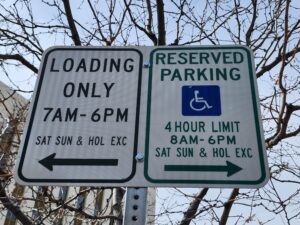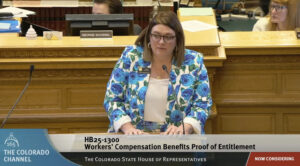By inking new laws Thursday that make it easier for Coloradans with disabilities and with wage-theft claims to demand damages from businesses, Gov. Polis completed a two-week dash in which he’s signed several bills that businesses opposed or sought to have amended.
Many of the new laws changed significantly from their introduced forms, with potential penalties to employers and financial hits to their bottom lines pared back after facing pushback from businesses and sometimes from the Democratic governor as well. But each of the roughly half-dozen statutes that Polis has put into the law books will affect business operations — and largely not for the positive, opponents have said.
In none of the specific cases is that truer than with House Bill 1001, which Polis signed in the governor’s carriage house Thursday afternoon in front of a crowd of government regulators and union leaders. The bill is a successor to one that Polis vetoed last year that would have required general contractors to pay wages withheld by unscrupulous subcontractors — a proposal that contractors opposed because it would have penalized them even if they followed the law.

Construction workers fix up the 16th Street Mall in Denver. Efforts to boost wage-theft enforcement often focus on that industry.
Few business gains on wage-theft law
HB 1001 takes a different approach from past bills to trying to stop nonpayment of wages and benefits or failure to grant breaks, permitting complainants to seek damages from even minority owners of businesses and to receive compensatory damages and attorneys’ fees. It allows state investigators to look into a larger range of cases, expands protections to independent contractors and assumes that employers who take adverse action against workers within 90 days of those workers filing a complaint are retaliating in doing so.
Business leaders argued that the provisions in HB 1001 will make it too easy for workers to file even frivolous complaints against law-abiding businesses without fear of blowback and could discourage funding of businesses by creating new liability for investors. Backers, including labor and workers-rights groups said, however, that the wide net it casts will cut down on a too-rampant problem and ensure employers compete on a level playing field.
“Wage theft is the largest source of theft in our state, with women and communities of color disproportionately becoming victims of wage theft,” said House Majority Leader Monica Duran, D-Wheat Ridge, who cosponsored the law. “With this new law, we’re allowing workers to more quickly access their owed wages and strengthening protections for whistleblowers so Coloradans can receive the money they have worked hard to earn.”
Despite four months of negotiations — HB 1001 didn’t receive its final approval until May 7, the final day of the legislative session — that bill changed very little from the version that was introduced. However, several other new laws took on substantial compromises, including another bill that Polis inked on Thursday afternoon.
Lawsuits on disability violations may increase

A sign indicates parking for people with disabilities on Sherman Street in Denver.
HB 1239 expands the legal recourses for Coloradans with disabilities when they allege discrimination, including restoring their ability in Colorado to sue for emotional damages after it was struck by the U.S. Supreme Court in 2022. But those damages are capped at $50,000, and a $5,000 statutory fine for anti-discrimination violations can be cut in half if businesses cure the violation within 30 days — two of several compromises in the law.
The final version of the bill didn’t leave opponents or proponents particularly happy, as testimony in an April 14 Senate Judiciary Committee hearing demonstrated. Nina DiSalvo, policy director for the Towards Justice law firm, said a bill meant to make victims whole should not “artificially cap damages.” And Courtenay Patterson, an attorney who has represented numerous small businesses targeted by legal actions, said HB 1239 is “making it easy for out-of-state attorneys to file frivolous and extortionist lawsuits.”
Still, proponents celebrated the signing.
“This bill ensures that people with disabilities can be compensated for attorney fees, emotional distress and other noneconomic harms if they experience discrimination or violation of their civil rights,” cosponsoring Sen. Mike Weissman, D-Aurora, said.
Price-gouging and tax bills

Sponsors of a bill to ban price gouging say diapers are one of the every-day items they want to go after with the bill.
Weissman seemed less enthusiastic about changes made to his HB 1010, which is meant to combat price gouging by defining the crime as raising prices 10% over a 180-day average after Coloradans have paid higher costs for eggs, diapers and other everyday goods. When it arrived from the House with a provision limiting its use by state officials to times of declared market disruptions or disasters, Weissman told the Senate Business, Labor and Technology Committee it was “quite a different bill than was introduced.”
While business groups like the Colorado Chamber of Commerce moved from opposing HB 1010 to seeking smaller amendments to it following that change, particular sectors like natural gas still argued it was unfair because their prices are set by national markets. Democratic sponsors, meanwhile, ramped up criticism of “corporate greed” as they lauded Polis’ signing of the legislation on May 9.
Without any fanfare, Polis on Friday signed HB 1296, which originally sought to roll back tax breaks to insurance companies, software developers and investors in enterprise zones but was gutted due to bipartisan opposition. However, Republicans and a handful of Democrats still railed against it, and sponsors vowed to bring back major provisions next year because of their frustration at the changes forced upon them this year.
Bills on emissions, fees, healthcare

Large buildings crowd the intersection of 16th Street and Broadway in downtown Denver.
Applause also was muted for Polis’ Tuesday signing of HB 1269, a heavily negotiated measure that creates a new enterprise into which commercial-building owners must pay to get help with reaching emissions-reduction goals by 2030. Groups like the Denver Metro Building Owners and Managers Association celebrated earlier because the bill got changed to reduce fines significantly and eliminated a 2026 deadline requiring 7% emissions reductions, leaving them only the 20% reduction requirement in five years.
Backers still celebrated the signing last month of HB 1090, which bars companies from charging “junk fees” like ticket-processing charges and lodging resort fees that are added onto the price of goods and services unless those fees are included in the advertised price. But before it passed, sponsors added safe-harbor language for federally regulated industries, capped damages against landlords and removed a proposed new private right of action.
Arguably the one business-opposed bill that Polis signed in recent weeks that would be considered a total loss for opponents is Senate Bill 45, which directs the Colorado School of Public Health to study implementation of a single-payer healthcare system after two failed attempts in recent years to pass a similar bill. Proponents stripped public funding from this year’s bill, letting gifts and grants pay for the research, and then pushed it through, setting up what opponents say is less a study of healthcare payment options and more a rubber stamp to promote a costly and ineffective idea.
Several business-opposed bills remain in limbo
Businesses continue to fight two bills that remain in front of the governor, hoping for vetoes like that which he gave to an overhaul of the Labor Peace Act on Friday.

Colorado state Rep. Jenny Willford explains her workers’ compensation bill, HB 1300, to the House in April. Willford also is the sponsor of Uber-focused HB 1291.
One of the bills, HB 1300, would allow injured workers to choose any doctor within 75 miles for their care following an on-the-job injury rather than choose just from a list of four vetted providers offered by their employers, who are paying for the care. Workers’ compensation insurer Pinnacol Assurance and state business groups argue the change will add enormous expenses and time to the care process, while unions and trial lawyers say the current rules take care decisions out of the hands of patients.
The other bill in limbo, HB 1291, would impose new requirements on rideshare providers like Uber and Lyft to ramp up background checks on drivers, allow for more requested recording of rides and be subject to a new private right of action for passengers against drivers and companies. Uber and Lyft say it opens them to costly liability even when drivers break their rules and contradicts with an existing law on data privacy, while sexual-assault victims say it will require the companies to police their drivers and will protect them more.
Polis has until June 6 to sign or veto bills passed during the 2025 session.
